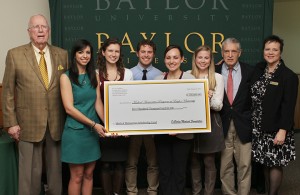
Matt Hellman | Lariat Photo Editor
By Ashley Pereyra
Reporter
The bridge between art and science grew smaller for the medical humanities program on Thursday.
The DeBakey Medical Foundation gave $500,000 to Baylor to increase the Michael E. DeBakey, Selma DeBakey, and Lois DeBakey Endowed Scholarship Fund for Medical Humanities majors. The gift brings the total amount that has been donated to the fund to one million dollars. The ceremony was held on the second floor atrium in the Baylor Sciences Building. It featured speakers from the DeBakey Medical Foundation, Baylor faculty and five scholarship recipients.
“The DeBakey name is medical royalty in American medicine and to have their support for a program like ours is priceless, ” Dr. Lauren A. Barron, associate program director of medical humanities, said.
Dr. George P. Noon, president of the DeBakey Medical Foundation, and Gale Galloway, a 1952 graduate of Baylor and trustee of the DeBakey Medical Foundation board, were also in attendance.
“I don’t know if most of you heard about Dr. Michael E. DeBakey. But he was a great scholar and believer of this program that you have here. So this is why we are here,” Noon said. “I started medical school about 50 years ago and all the information I have, with what you have been learning, I’ve had in 50 years on-the-job training. And you guys are going to get it in four years.”
Baylor is one of the only universities in the United States to offer a medical humanities major. The medical humanities degree is composed of a wide selection of courses from the medical humanities department and other departments like English, religion, philosophy, history, sociology and psychology.
“It is a radical, revolutionary kind of approach to educating health care professionals.” Barron said. “It’s not about art over science. It is about both. It is bringing both of them together in a way that is going to make the way for the best physicians.”
The medical humanities department offers the DeBakey scholarship yearly. It is awarded to junior and senior medical humanities majors.
Houston senior, Stephanie Allen, a medical humanities and biology major, believes that her DeBakey scholarship and medical humanities major have helped her in medical school interviews.
“It’s offered really interesting conversation points in med school interviews and the medical humanities program have as well,” she said. “So it’s made me into a much more well rounded applicant and as well as a much more well rounded person—maybe as [compared to] what my counter parts that haven’t had these sorts of experiences.”
Allen is a finalist for the Fulbright scholarship with plans to attend the London School of Hygiene and Tropical Medicine. She also emphasized the importance that the medical humanities major and the scholarship has had on her education.



